英语从句分类与解析
高中英语状语从句用法详细解析

高中英语状语从句用法详细解析之五兆芳芳创作一、定义:在句中作状语的从句是状语从句,修饰主句中的动词、形容词或副词等.状语从句由从属连词引导,从属连词在句中不充当句子成分,只起连接作用,状语从句放在句首时,要用逗号,放在句尾时不必.二、分类按照意义上的不合,状语从句可分为:①时间状语从句②地点状语从句③原因状语从句④目的状语从句⑤条件状语从句⑥结果状语从句⑦让步状语从句⑧方法状语从句⑨比较状语从句三、时间状语从句(一)引导时间状语从句的连词有:as, when(whenever), before, after, as soon as,until(till), since, every time, once.(二)、“as” as, when, while都有“当……的时候”,可以互用When she was a child.While she was a child. She Lived in Paris.As she was a child.as有“一边…一边”的意思He sang as he walked.“when” When the clock struck twelve, all the lights went out.I was sleeping when she came in. 动补When we arrived at the station, the train had left.“while” 主、从句动作或状态同时产生.用while引导的从句用延续性动词,常暗示较长的时间或一个进程.While we were having supper, all the lights went out.Please keep quiet while others are studying.While I was writing letters last night, he was watching TV. when, while并列连问.when和while都可用作并列连问,连接并列分句.When暗示“就在……的时候”, while意反而,可是,暗示转折.One evening Beethoven was walking in a street, when he suddenly stopped outside a little house.并列连词引导并列句,意思是就在那时.(三)、主句是一般未来时,时间状语从句用一般现在时表未来,主句是过来未来时,从句用一般过来时暗示过来未来时,主句是一般过来时,从句用一般过来时.1. I' ll call you when I get there.2. They said they would leave when they got the new.3. They left as soon as they got the new.Whenever 无论什么时候,随时1. Whenever someone throws in some rubbish, the truck produces a piece of music.每当有人扔进一些垃圾时,它(汽车)就放一段音乐.2. Whenever we' re in trouble, they will help us.3. I go to the theatre, whenever I am free.4. Come and see me whenever you want to.你随时来看我.till和until(暗示“直到……”)句首多用until1、在肯定句中暗示“直到……为止”,主句谓语动词要用延续性动词.I was waiting until/till he arrived.2、在否认句中暗示“直到……才”主句谓语动词经常使用终止性动词,这时until和till常被before替换.I didn' t leavetill/until she came back.since: 主句用完成时,从句用一般过来时,since引导的从句间或可用现在完成时.It is two years since I have studied English.1. We have known each other since we were children.2. We have been friends (ever since) since we met at school.3. It is ……(一段时间)+since+一般过来时态句子.It is two years since my sister married.……(一段时间) have/has passed since +一般过来时态句子Two sisters have/has passed since my sister married.Since+时间点1. I have been at home since three o' clock this afternoon.2. Maria has been in China since two years ago.*every time, each time, next timeEvery time you get back at night, you drop your boots on the floor.Every time I catch cold, I have pain in my back.(every time 分写不成以合写) 比较everyday (adj) 日常的,普通的every day 是名词短语,每天,天天Next time I go there, I will visit them.* once 一旦…就Once you begin, you must go on. 你一开了头,就应该持续下去.四、地点状语从句地点状语从句用where, wherever引导We should go where the people need us.我们应该去人民需要我们的地方.Where there is a will, there is a way.有志者,事竟成.Wherever they went, they received a worm welcome.无论他们走到哪儿都受到热烈欢送.She follow him whose he goes. 他无论到哪里她总随着.五、原因状语从句原因状语从句用because(因为),since(既然), as(由于)引导1、字母由多到少,语气由强到弱.2、由why提问必须用because答复.Since, as不答复why的提问,并且从句一般放在句首,because一般放在主句之后.3、 before of +名词Because of the rain, we didn' t go to the park.4、 because 和so不成连用,只能选其一.(另有although, but)Why didn' t he come to school? Because he was ill.Since I must die, I must. 既然我一定要死,我一定这样做.Since a lot of people make mistakes in life, Mr Smith wanted to give John a Chance.5、 for并列连词,不克不及放在句首,主要放在两个并列句之间.For所提供的理由为一个弥补说明,并且前面常有逗号离隔.The days we short, for it is December now.*改错 Because he is ill is the reason why he can' t come. (Because改成that)六、目的状语从句目的状语从句用so(经常使用于口语), that, so that, in order that引导目的状语从句的谓语常含有may, might, can, could, should, would等情态动词.1. We' ll sit never to the front so we can hear better.2. He studied hard so that he mightsucceed.他努力学习,以便成功.3. I' ll speak slowly so that you can take notes.我慢慢讲,以便你们能做笔记.4. They hurried to the station in order that they could catch the train.他们仓猝赶往火车站,以便能遇上火车.5.I took a taxi so that I could get there earlier.6.I' m going to the lecture early so that I may get a good seat.我打算早些去听讲座,以便找个好座位.七、条件状语从句条件状语从句由if, unless, (so) as long as(只需)引导在条件状语从句中要用一般时暗示未来时(与时间状语从句相同)We will miss the train if you don' t hurry.He said we would miss the train if we didn' t hurry.You will fail the exam unless you study hard. (if you don' t study hard)He won' t come unless he is invited. (if he isn' t invited)Eat less food unless you want to become fatter. (if you don' t want to become better)As long as you are not afraid of difficulties, you are sure to succeed.As long as you don' t lose heart, you will succeed.八、结果状语从句结果状语从句由such…that, so….that, s o that, that 引导1. such… that 的经常使用句型such +a/an +形容词+可数名词单数+thatsuch +形容词+可数名词单数+thatSuch+形容词+可数名词单数(不成数名词)+that注意so many (much, few, little) +名词,such a lot of (或lots of)+名词是习用法,不成乱用.She is such a beautiful girl that we all like her.They were such beautiful flower that we bought home.It was such delicious food that they ate it up.2. so+形容词或副词+thatso+形容词+a/an+可数名词单数+thatHe is so rich that he can buy lot of things for himself.He works so hard that he did everything well.It was so hot a day that we all went swimming.It was such a good day that we all went swimming.3.so that, that都可以引导结果状语从句He didn' t study hard, (so) that he failed theexam.4.too…to, enough…to 可以引导结果状语从句与so…that 替换,so…that结构可以用too…to替换必须具备两个条件,一是主句和结果状语从句的主语必须一致,二是从句中的谓语部分必须含有can(could) not.She is young that she can' t go to school.She is too young to go to school.She isn' t old enough to go toschool.九、让步状语从句although, thougheven though = even if, whether…orhowever = no matter howwhatever = no matter whatwhoever = no matter whowhenever = no matter whenwherever = no matter where*although和though都暗示“虽然”只是although 更正式,多用于句首,而though用于句中,两者都可与yet, still连用,但不与but连用Although/Though they are poor, they often help others.They are poor, but they often help others.Although he has failed many times, he doesn' t give up trying.Whatever/No matter what you say, I won' t believe you.No matter what you say, I don' t care.No matter who you are, you must obey the rules of our school.However hard he tried, he failed again.No matter what the weather is like, you can always find surfers out riding the waves.十、方法状语从句方法状语从句由as(如同,依照),as if (though)引导*as和like都有“像”的意思,as是连词,前面连接句子,like是介词前面可加名词、代词或名词性短语.I did the work as others did. 相当于 I did like others.You must do as I do.asif(though)两者意义相同,从句谓语动词经常使用虚拟语气,但实现可能性较大,则用连接词.It seems asif/though it' s going to rain.They are talking as if/though they were old friends.She treats me as if I were her brother.When you are in home, do as the Romans do.例You must do ______ I told you.A. after B. before C. where D. as (D)The students must do ______ the teacher told them.A. as B. before C. after D. if (A)十一、比较状语从句比较状语从句由as…as, not as(so)…as, than, the+比较级,the+比较级引导He swims as well as you. (do)He doesn' t swim as well as you (do).He got here earlier than you. (did)The busier he is, the happier he feels.英语语法状语从句类型综述状语从句主要用来修饰主句或主句的谓语.一般可分为九大类,辨别暗示时间、地点、原因、目的、结果、条件、让步、比较和方法.尽管种类较多,但由于状语从句与汉语结构和用法相似,所以理解和掌握它其实不难.状语从句的关头是要掌握引导不合状语从句的经常使用连接词和特殊的连接词即考点.现辨别列举如下: 1.时间状语从句经常使用引导词:when, as, while, as soon as, while, before, after, since , till, until 特殊引导词:the minute, the moment, the second, every time, the day,the instant, immediately , directly, no sooner … than, hardly …when, scarcely … whenI didn’t realize how special my mother was until I became an adult. While John was watching TV, his wife was cooking. The children ran away from the orchard(果园) the moment they saw the guard. No sooner had I arrived home than it began to rain.Every time I listen to your advice, I get into trouble.2.地点状语从句经常使用引导词:where特殊引导词:wherever, anywhere, everywhereGenerally, air will be heavily polluted where there are factories. Wherever you go, you should work hard.3.原因状语从句经常使用引导词:because, since, as, since特殊引导词:seeing that, now that, in that, considering that, given that, considering that, inasmuch as, insomuch asMy friends dislike me because I’m handsome and successful. Now that everybody has come, let’s begin our conference. The higher income tax is harmful in that it may discourage people from trying to earn more. Considering that he is no more than 12 years old, his height of 1.80 m is quite remarkable.4.目的状语从句经常使用引导词:so that, in order that特殊引导词:lest, in case, for fear that,in the hope that, for the purpose that, to the end thatThe boss asked the secretary to hurry up with the letters so that he could sign them. The teacher raised his voice on purpose that the students in the back could hear more clearly.5.结果状语从句经常使用引导词:so … that, so… that, such … that, 特殊引导词:such that, to the degree that, to the extent that, to such a degree that,He got up so early that he caught the first bus.It’s such a good chance that we must not miss it. To such an degree was he excited that he couldn’t sleep last night.6.条件状语从句经常使用引导词:if, unless, 特殊引导词:as/so long as, only if, providing/provided that, suppose that, in case that, on condition thatWe’ll start our project if the president agrees.You will certainly succeed so long as you keep on trying. Provided that there is no opposition, we shall hold the meeting here.7.让步状语从句经常使用引导词:though, although, even if, even though特殊引导词: as(用在让步状语从句中必须要倒装),while ( 一般用在句首 ),no matter …, in spite of the fact that, while, whatever, whoever, wherever, whenever, however, whicheverMuch as I respect him, I can’t agree to his proposal. 尽管我很尊敬他,我却不合意他的建议.The old man always enjoys swimming even though the weather isrough. No matter how hard he tried, she could not change her mind. He won’t listen whatever you may say. 8.比较状语从句经常使用引导词:as(同级比较), than(不合程度的比较)特殊引导词:the more … the more … ; justas …,so…; A is to B what /as X is to Y; no … more than; not A so much as B She is as bad-tempered as her mother. The house is three times as big as ours. The more you exercise, the healthier you will be.Food is to men what oil is to machine. 食物之于人,犹如油之于机械.9.方法状语从句经常使用引导词:as, as if, how 特殊引导词:the way When in Rome, do as the Roman do. She behaved as if she were the boss. Sometimes we teach our children the way our parents have taught us.。
从句(语法)

英语从句分类与解析从句是相对于主句而言的,即它是从属于某一个主句,而不能单独作一个句子。
在英语中,主要有三大从句,即名词性从句(包括主语从句,宾语从句,表语从句,同位语从句)、形容词性从句(即定语从句)、副词性从句(即状语从句,包括时间、条件、结果、目的、原因、让步、地点、方式等)。
主语从句用作主语,如::That the earth is round is true.地球为圆的是真实的。
宾语从句用作宾语。
如:Do you know where he lives?表语从句用作表语,如:My opinion is that you should not go alone.我的意见是你不应单独前往。
同位语从句用于解释说明前面的名词。
如:The fact that the earth is round is true.地球是圆的的事实是真实的。
(that从句用于解释说明the fact)定语从句相当于一个形容词,用于修饰前面的名词。
如:The student who answered the question was John.回答问题的学生是John.状语从句相当于一个副词,如:When it rains,I usually go to school by bus.天下雨时,我通常坐公共汽车上学。
(时间状语)If he comes tomorrow,you will see him.如果他明天来,你就可以看见他。
(if 引导的条件状语从句,其结构为:if +状语从句,+主句)。
要注意在状语从句中有一个规则是“主将从现”,即主句是将来时,则从句要用一般现在时表示将来。
He returned home to learn his daughter had just been engaged.他回家后得知女儿刚刚订婚了。
(结果状语,结果状语只是仅限于learn(得知),find(发现),see,hear,to be told(被告知),make(使得)等具有界限含义的动词。
高一英语《名词性从句》讲解

功能
例词
只起连接作 that, whether, 从属 用,不充当从 if,as if(只用 连词 句中的任何作 于表语从句) 用。
功能
例词
既起连接作用, Who,whom, 连接 本身又做从句 whose,what, 代词 的主语、宾语、 which 表语或定语。
功能
例词
when,where, 既起连接作用, 连接 why,how 本身又做从句 副词 的状语。
(1) They expressed the hope that they would come over to visit China again. (2) We all know the truth that the earth goes round the sun. (3) The fact that she had not said anything surprised all of us.
(1) 在whether or not结构中不可 用if代替whether
I don’t know whether or not he’ll come. I wonder whether it is true or not.
(2)介词后面的宾语从句用whether, 不用if
Everything depends on whether the situation will improve.(后面要讲 到介词后面的宾语从句)
3、It + be + 过去分词 + that从句 It is said that – clause
reported
thought hoped believed known
(1) It is said that he is the best student in the class.
2023年高中英语语法:名词性从句用法详解及强化练习分析

2023年高中英语语法:名词性从句用法详解及强化练习分析名词性从句分类简述名词性从句,就是指其作用相当于名词的从句,它包括主语从句、表语从句、宾语从句和同位语从句。
一、主语从句1. 引导词:主语从句就是在复合句中用作主语的从句,引导主语从句的引导词主要有三类:一是that;二是whether;三是那些可以用作疑问词的词语,如what, who, which, when, where, how, why 等。
如:That we shall be late is certain. 我们要晚了,这是确定无疑的。
What he says is not important. 他说的话并不重要。
Whether it will do us harm remains to be seen. 是否对我们有害还要看一看。
2. 形式主语:有时为了避免句子显得“头重脚轻”,可用it作形式主语放在句首,而把真正的主语放在句末。
如:It’s a pity that he didn’t come. 很遗憾他没来。
It was uncertain whether he could come or not. 他是否会来还不肯定。
这三句句首的it均为形式主语,相应的真主语分别是that he didn’t come / what she did / whether he could come or not。
二、表语从句表语从句就是在复合句中用作表语的从句。
一般说来,可用于引导主语从句的引导词也可用于引导表语从句,如that, what, who, which, when, where, how, why, whether等。
如:My idea is that we should do it right away. 我的意见是马上就干。
That is what he meant. 这就是他的意思。
The problem is how we can find him. 问题是我们如何找到他。
英语定语从句语法解析

英语定语从句语法解析语语法是针对英语语言进行研究后,系统地总结归纳出来的一系列语言规则。
英语语法的精髓在于掌握语言的使用。
下面店铺带来英语定语从句语法解析,欢迎阅读!英语定语从句语法解析篇11.先行词为all, anything, something, nothing, everything, much, little, none等不定代词时,关系代词一般只用that,不用which。
在大多数情况下that可以省略.Please tell me everything you know about the matter.Thats all we can do at the moment.2.as引出的限制性定语从句在such as的结构中as可作关系代词,引出限制性定语从句。
有时和same连用,在从句中可作主语、宾语或表语等。
Such people as were recommended by him were reliable.Ive never seen such a talented young man as he is.I have the same trouble as you .3.as引出的非限制性定语从句as可作关系代词引出非限制性定语从句,代替整个主句,通常译为(正)如一样,(正)象一样等。
as引导的从句一般用逗号与主句隔开,可以位于主句的前面、中间或后面.I live a long way from work, as you know.She did not, as her friend had feared, break down.As is generally accepted, economic growth is determined by the smooth development of production.4.分隔式定语从句定语从句一般紧跟在先行词之后,但有时会被其他句子成分与先行词隔开,从而构成分隔式定语从句。
英语从句分类与解析
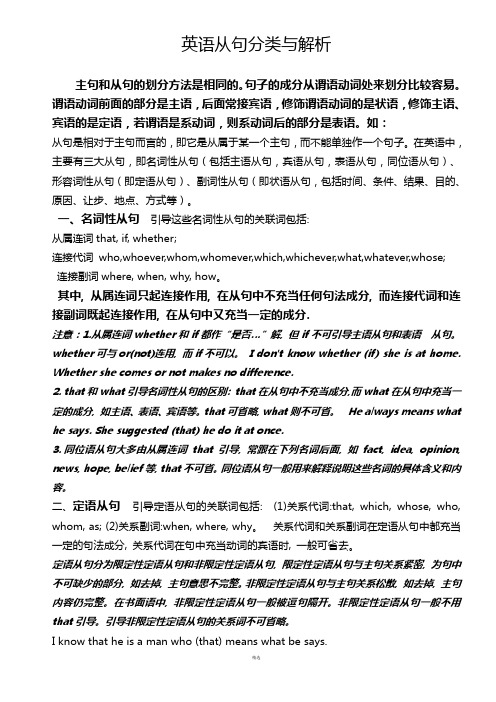
英语从句分类与解析主句和从句的划分方法是相同的。
句子的成分从谓语动词处来划分比较容易。
谓语动词前面的部分是主语,后面常接宾语,修饰谓语动词的是状语,修饰主语、宾语的是定语,若谓语是系动词,则系动词后的部分是表语。
如:从句是相对于主句而言的,即它是从属于某一个主句,而不能单独作一个句子。
在英语中,主要有三大从句,即名词性从句(包括主语从句,宾语从句,表语从句,同位语从句)、形容词性从句(即定语从句)、副词性从句(即状语从句,包括时间、条件、结果、目的、原因、让步、地点、方式等)。
一、名词性从句引导这些名词性从句的关联词包括:从属连词that, if, whether;连接代词who,whoever,whom,whomever,which,whichever,what,whatever,whose;连接副词where, when, why, how。
其中, 从属连词只起连接作用, 在从句中不充当任何句法成分, 而连接代词和连接副词既起连接作用, 在从句中又充当一定的成分.注意:1.从属连词whether和if都作“是否…”解, 但if不可引导主语从句和表语从句。
whether可与or(not)连用, 而if不可以。
I don't know whether (if) she is at home. Whether she comes or not makes no difference.2.that和what引导名词性从句的区别: that在从句中不充当成分,而what在从句中充当一定的成分, 如主语、表语、宾语等。
that可省略, what则不可省。
He always means what he says. She suggested (that) he do it at once.3.同位语从句大多由从属连词that引导, 常跟在下列名词后面, 如fact, idea, opinion, news, hope, belief等, that不可省。
语法精讲——从句的辨析
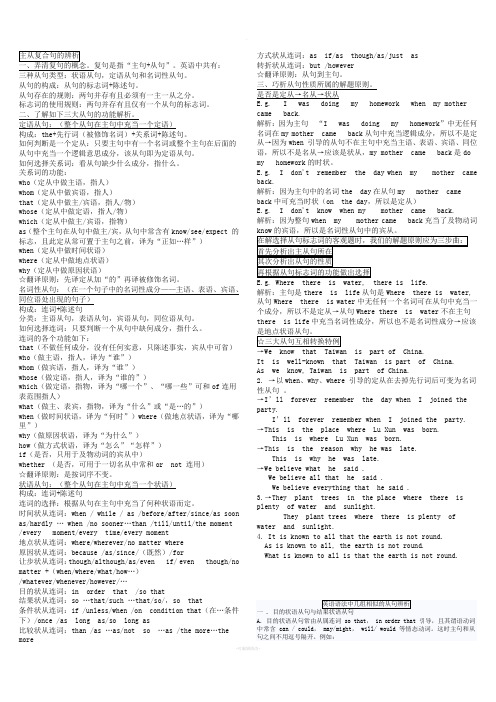
一、弄清复句的概念。
复句是指“主句+从句”。
英语中共有:三种从句类型:状语从句,定语从句和名词性从句。
从句的构成:从句的标志词+陈述句。
从句存在的规则:两句并存有且必须有一主一从之分。
标志词的使用规则:两句并存有且仅有一个从句的标志词。
二、了解如下三大从句的功能解析。
定语从句:(整个从句在主句中充当一个定语)构成:the+先行词(被修饰名词)+关系词+陈述句。
如何判断是一个定从:只要主句中有一个名词或整个主句在后面的从句中充当一个逻辑意思成分,该从句即为定语从句。
如何选择关系词:看从句缺少什么成分,指什么。
关系词的功能:who(定从中做主语,指人)whom(定从中做宾语,指人)that(定从中做主/宾语,指人/物)whose(定从中做定语,指人/物)which(定从中做主/宾语,指物)as(整个主句在从句中做主/宾,从句中常含有know/see/expect 的标志,且此定从常可置于主句之前,译为“正如…样”)when(定从中做时间状语)where(定从中做地点状语)why(定从中做原因状语)☆翻译原则:先译定从加“的”再译被修饰名词。
名词性从句:(在一个句子中的名词性成分——主语、表语、宾语、同位语处出现的句子)构成:连词+陈述句分类:主语从句,表语从句,宾语从句,同位语从句。
如何选择连词:只要判断一个从句中缺何成分,指什么。
连词的各个功能如下:that(不做任何成分,没有任何实意,只陈述事实,宾从中可省)who(做主语,指人,译为“谁”)whom(做宾语,指人,译为“谁”)whose(做定语,指人,译为“谁的”)which(做定语,指物,译为“哪一个”、“哪一些”可和of连用表范围指人)what(做主、表宾,指物,译为“什么”或“是…的”)when(做时间状语,译为“何时”)where(做地点状语,译为“哪里”)why(做原因状语,译为“为什么”)how(做方式状语,译为“怎么”“怎样”)if(是否,只用于及物动词的宾从中)whether (是否,可用于一切名从中常和or not 连用)☆翻译原则:是按词序不变。
考研英语语法(从句)详细解析总结(含例句)

考研英语语法(从句)详细解析总结(含例句)(一)英语从句的原理1.我们已经学习过句子的成分【参考句子成分讲义】当一个完整的句子A成为另一个句子B的某一成分时,A就变成了从句●eg. I know that you are hard-working!我知道你们很努力●完整的句子A { you are hard-working } 就叫做从句,在主句 B [I know A]中作宾语➡️A随从/服从B2.英语的三种句子●简单句:不能再拆分的句子【参考简单句讲义】●复杂句:也叫做并列句,两个句子不分主次,仅仅逻辑关系词连接and、but、however,,,●eg. I like apples,and he likes bananas. = He likes bananas,and I like apples.●复合句:主从复合句,主句 + 从句,两个句子有主次关系(二)英语从句的分类所以有哪些句子成分就会有哪些从句类型:除了英语的核心动词之外,其他所有句子成分都可以有从句1.①形容词从句 = 定语从句 = 关系从句➡️英语从句中最重要的;内容最多的;最难的一类从句●概念●对某个人或者事物进行描述,具有形容词性质➡️形容词性从句●在句子中充当定语这个成分,起修饰作用➡️定语从句●构成往往需要关系词来引导➡️关系从句●形容词从句的思维方式●中文思维:形容词都放在被修饰词之前,即形容词/句子 + 的eg. 好吃的苹果;努力学习的他们●英语思维●单个词修饰时,也放在被修饰词之前eg. a tasty apple●用一句话来修饰时,就需要在被修饰词后面 + 一个与它有关系的词 + 另一个句子,即先行词 + 关系词 + 定语从句●思维对比:这也是我们在翻译时不能逐字逐句顺序进行的原因,定语从句就需要逆序先翻译●中文:兔子在吃一根我买来的胡萝卜【前置】●英语:兔子在吃一根胡萝卜(胡萝卜的关系词)我买的【后置】The rabbit is eating a carrot that I bought.●形容词从句的构成:关系词(引导定语从句)●关系代词:引导词起指代、替代的作用●方法:陈述句语序中,被修饰词更换为关系代词➡️把关系代词放到开头,就变成了从句●that(那):The rabbit is eating a carrot that I bought.I bought that →that I bought●who(主语):The student who is reading is my friend.who is reading →who is reading●whom(宾语):The student whom I taught is my friend.I taught whom →whom I taught●whose(ta的):The student whose bag is pink is my friend.whose bag is pink →whose bag is pink●which(那个):The student which is reading/I taught is my friend.which is reading/I taught which →which is reading/I taught●that & which:指代人或物(主语宾语都可以),经常可以互换●先行词唯一:that●eg. The rabbit ate the biggest carrot that I 've ever seen. 兔子吃了我见过最大的胡萝卜●the biggest已经限定了先行词是唯一的,所以只能用that●先行词多选一:which●eg. The rabbit is eating a carrot that/which I bought.●我买了很多根胡萝卜,兔子吃的只是其中随便一根●关系副词:引导词的词性是副词关系副词 = 介词 + 关系代词●where(地点):This is the place where I study.●why(原因):This is the reasin why I study.●when(时间):That was the day when I met him.●形容词从句的限定性和非限定性●通过前面的学习,大家已经明白了定语从句的主要功能就是修饰限定范围,所以限定性和非限定性的区别即:是否限定了先行词的范围/性质●限定性定语从句●上述例句均为限定性定语从句:全部都限制了先行词的范围●非限定性定语从句:通常有逗号隔开,作插入语补充信息●eg. I read the book,which is on the desk. 我读了本书,那本书在桌子上(有种接着说,补充说明的意思)●eg. My head,which is big,is useful when it rains. 我有大头下雨不愁(作插入语补充信息,即使删去也不影响原句子完整)●eg. Rabbits eat carrots, which is not surprising. 兔子吃胡萝卜,这事不稀奇(甚至可以指代一个完整的句子进行修饰)2.②名词从句●引导词:相当于一个信号告诉你“那么接下来从句要开始咯!”注意:引导词在从句开头;从句是陈述句语序●that:确定信息●whether;where;when;how;who;what:不确定信息●主语从句:将句子中的主语变成从句的形式●正常语序:主语放在句子最开头●eg. That rabbits eat carrots is obvious.●eg. Whether rabbits eat carrots is obvious. 是否吃●eg. Where rabbits eat carrots is obvious. 在哪吃●eg. When rabbits eat carrots is obvious. 什么时候吃●eg. Who eats carrots is obvious. 谁吃●eg. What rabbits eat is obvious. 吃什么●eg. How rabbits eat carrots is obvious. 怎么吃●形式主语:it指代主语从句,it本身没有什么意义【翻译时,可以拆成两句或是倒序先翻译主语从句】英语句子的主语从句过长就会头重脚轻,所以会改个形式说出来●eg. It is obvious that rabbits eat carrots. 很明显,兔子吃胡萝卜/兔子吃胡萝卜这事儿很明显●eg. It is obvious whether rabbits eat carrots.●可自行练习改写上述例句●表语从句:将句子的表语变成从句的形式●eg. The reason is that you need to study.●eg. It feels that you like me.●同位语从句:将句子的同位语变成从句的形式●一般修饰抽象名词:the fact;the idea...●eg. The question that/whether rabbits eat carrots is interesting.●宾语从句:从句作句子的宾语●确定信息&不确定信息●eg. I know that rabbits eat carrots.●eg. I know whether/where/... rabbits eat carrots.●宾语从句引导词that往往可以省略,注意判断●eg. I know rabbits eat carrots.●宾语从句的否定●在谓语动词前否定,而非在从句中,否则会有句意的改变●eg. I don't know rabbits eat carrots.●eg. I don't think rabbits eat carrots.●eg. I don't believe rabbits eat carrots.●主从时态一致,但从句描述客观规律例外●eg. I knew you gratuated last year.●eg. I knew the sun rises in the east.●宾补从句:从句作句子的宾语补足语●使用较少●eg. You can call me whatever you like. 你随便怎么称呼我都可以●eg. My parents made me who I am.3.③副词从句 = 状语从句英语从句中种类最多的➡️因为补充说明的可能性最多●概念●在句中起到副词的作用,一般补充说明动词、形容词、副词等➡️副词从句●句子成分上说,充当了句子的状语➡️状语从句●时间状语从句●在某一时间点之前:before●eg. I cleaned the room before you came.●= Before you came, I cleaned the room.●在某一时间点之中●when:强调在某个时间点●eg. I was watching TV when my mom came home. 当我妈妈回家时,我正在看电视●= When my mom came home,I was watching TV.●while:强调在一个时间段内●eg. I was watching TV while my mom was cooking. 我妈妈做饭时,我在看电视●= While my mom was cooking,I was watching TV.●as:强调同时进行的两个动作●eg. My mom cooked as she watched TV. 我妈妈一边做饭一边看电视●= As my mom watched TV,she cooked.●在某一时间点之后:after●eg. I go to school after I get up.●= After I get up,I go to school.●从之前某一时间点开始算起的一个时间段,往往暗示了对之后有影响(完成时态)since●eg. I have read two books since my mom came home. 自从我妈妈回家以后,我已经看了两本书了●直到之后的某一时间点:until●eg. I waited until my mom came home. 我一直在等,直到妈妈回家●not,,,until,,,:直到,,,才,,,(注意翻译方法)●eg. I didn't go to sleep until my mom came home. 直到我妈妈回家我才睡觉●一个动作紧跟着另一个动作发生:as soon as(注意翻译顺序:一,,,就,,,)●eg. It rained as soon as we went to schoo. 我们一去上学,就下雨了●下次,,,:the next time●eg. I will hug you the next time we meet. 下次我们见面时我一定会拥抱你●地点状语从句●引导词:where●eg. I read books where I study.●强调形式:wherever不管哪里;everywhere所有地方;anywhere任何地方●eg. I read books wherever/everywhere/anywhere I can sudy.●条件状语从句从句比主句落后一个时态●真实条件句:真实的假设 if●eg. If the rabbit sees a carrot,it will eat it.●虚假的假设:if【参考虚拟语气讲义】●否定条件句:unless 除非,,,否则/不然●eg. Unless it rains,the game will be played. 除非下雨,比赛将正常进行●= If it doesn't rain,the game will be played.●其他引导词:as long as只要;in case如果●eg. You may borrow my book as long as you keep it clean. 只要你保持书的清洁,你就可以把我的书借去。
高中语法解析从句的分类与用法
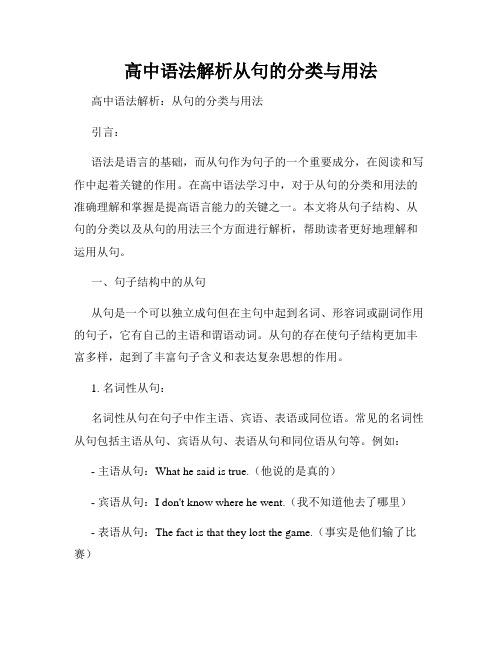
高中语法解析从句的分类与用法高中语法解析:从句的分类与用法引言:语法是语言的基础,而从句作为句子的一个重要成分,在阅读和写作中起着关键的作用。
在高中语法学习中,对于从句的分类和用法的准确理解和掌握是提高语言能力的关键之一。
本文将从句子结构、从句的分类以及从句的用法三个方面进行解析,帮助读者更好地理解和运用从句。
一、句子结构中的从句从句是一个可以独立成句但在主句中起到名词、形容词或副词作用的句子,它有自己的主语和谓语动词。
从句的存在使句子结构更加丰富多样,起到了丰富句子含义和表达复杂思想的作用。
1. 名词性从句:名词性从句在句子中作主语、宾语、表语或同位语。
常见的名词性从句包括主语从句、宾语从句、表语从句和同位语从句等。
例如:- 主语从句:What he said is true.(他说的是真的)- 宾语从句:I don't know where he went.(我不知道他去了哪里)- 表语从句:The fact is that they lost the game.(事实是他们输了比赛)- 同位语从句:I heard the news that she got the scholarship.(我听说她获得了奖学金)2. 定语从句:定语从句用来修饰一个名词或代词,并对其进行进一步解释或限制。
定语从句通常由关系代词(that, who, whom, which等)引导,并放在被修饰的名词或代词之后。
例如:- The book that I bought yesterday is very interesting.(我昨天买的那本书非常有趣)3. 状语从句:状语从句用来修饰一个动词、形容词或副词,表示时间、原因、条件、目的、结果等关系,并对主句进行补充说明。
常见的状语从句包括时间状语从句、原因状语从句、条件状语从句、目的状语从句和结果状语从句。
例如:- 时间状语从句:After she finished her homework, she went to bed.(她做完作业后就去睡觉了)- 原因状语从句:He failed the exam because he didn't study hard.(他考试不及格是因为他没有用功学习)- 条件状语从句:If you come early, we can have lunch together.(如果你早点来,我们可以一起吃午饭)- 目的状语从句:She studied hard so that she could pass the exam.(她努力学习以便能通过考试)- 结果状语从句:He was so tired that he fell asleep immediately.(他太累了,结果立刻睡着了)二、从句的分类与用法从句根据从属关系和在句中的作用可以分为几种类型,并在句子中扮演不同的角色。
(英语)英语试卷英语定语从句题分类汇编及解析

(英语)英语试卷英语定语从句题分类汇编及解析一、定语从句1.The lady spoke to me in the shop is my aunt.A.Which B.whoC.where D.What【答案】B【解析】试题分析:句意:在商店与我说话的那位女士是我的姑姑。
A. Which哪一个;B. who 谁;C. where 在哪; D. What什么。
The lady为先行词,指人,引导词用who或that,故答案为B。
考点:考查定语从句的引导词。
2.The TV play is about a true story ___________ happened in Lijiang in 1998.A.it B.what C.that D.when【答案】C【解析】【详解】句意:这部电视剧讲的是1998年发生在丽江的一个真实故事。
考查定语从句引导词。
it和what不可引导定语从句,可排除AB两项。
when用于先行词指时间时;that多指物,有时也指人,在定语从句中作主语或宾语。
本句story是物,引导词在从句中做主语,需用连接代词that;根据句意结构,可知选C。
3.When we speak of culture, we mean a way of life_________ a group of people have in common.A.what B.who C.where D.that【答案】D【解析】【详解】句意:当我们说起文化的时候,我们指的是一群人共同拥有的生活方式。
考查定语从句的引导词。
根据句意:当我们说起文化的时候,我们指的是一群人共同拥有的生活方式。
逗号后面的句中是含有定语从句的复合句,先行词是 life,表示“物”,用引导词 that,在从句中做宾语。
what 不能引导定语从句。
先行词是“人”,引导词常用 who。
where 在定语从句中做地点状语。
故选D。
【点睛】引导定语从句的关联词包括关系代词和关系副词。
(完整版)高中英语语法总结-名词性从句
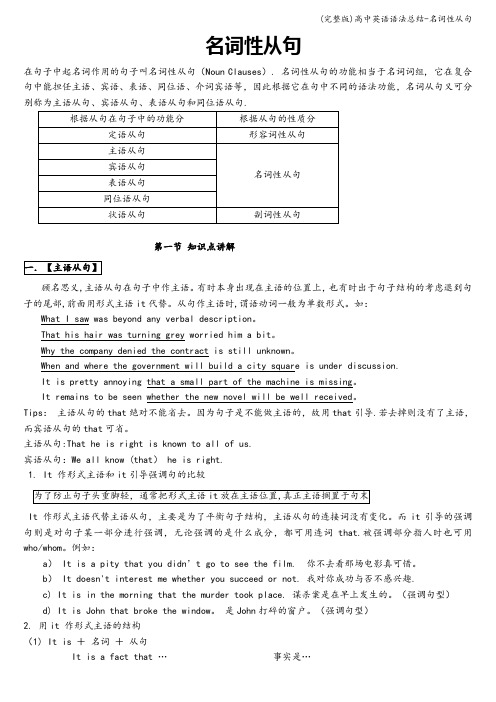
名词性从句在句子中起名词作用的句子叫名词性从句(Noun Clauses). 名词性从句的功能相当于名词词组, 它在复合句中能担任主语、宾语、表语、同位语、介词宾语等,因此根据它在句中不同的语法功能,名词从句又可分别称为主语从句、宾语从句、表语从句和同位语从句.第一节知识点讲解顾名思义,主语从句在句子中作主语。
有时本身出现在主语的位置上,也有时出于句子结构的考虑退到句子的尾部,前面用形式主语it代替。
从句作主语时,谓语动词一般为单数形式。
如:What I saw was beyond any verbal description。
That his hair was turning grey worried him a bit。
Why the company denied the contract is still unknown。
When and where the government will build a city square is under discussion.It is pretty annoying that a small part of the machine is missing。
It remains to be seen whether the new novel will be well received。
Tips:主语从句的that绝对不能省去。
因为句子是不能做主语的,故用that引导.若去掉则没有了主语,而宾语从句的that可省。
主语从句:That he is right is known to all of us.宾语从句:We all know (that) he is right.1. It 作形式主语和it引导强调句的比较It 作形式主语代替主语从句,主要是为了平衡句子结构,主语从句的连接词没有变化。
而it引导的强调句则是对句子某一部分进行强调,无论强调的是什么成分,都可用连词that.被强调部分指人时也可用who/whom。
句子结构 02 宾语从句和定语从句

二、复合句复合句是由一个主句和一个或一个以上的从句构成的句子。
主句和从句都具有完整的主谓结构,主句是全句的主体,从句是主句中的一部分,不能独立存在。
根据从句在全句中的不同作用,从句可分为:宾语从句、定语从句、状语从句、主语从句、表语从句和同位语从句。
在这里重点讲解宾语从句、状语从句和定语从句。
(一)宾语从句1.宾语从句的引导词注意:Whether和if引导宾语从句时,一般情况下可以互换,但在下列情况下须用whether,不能用if。
①具有选择意义,宾语从句中有or或or not时。
例如:We really don’t know whether the news is true or not.我们真的不知道这消息是否是真的。
②在介词后接宾语从句或不定式时。
例如:We are talking about whether we’ll go back to our hometown.我们正在讨论是否回老家去。
③作discuss等词的宾语时。
例如:We discussed whether we should close the shop.我们讨论了是否应该把商店关掉。
2.宾语从句的语序宾语从句无论是陈述句、一般疑问句或特殊疑问句意义,一律用陈述句语序,即“主语+谓语”结构。
句尾标点符号取决于主句。
例如:Are you a student?He asks.→He asks if you are a student.他问你是否是学生。
Where does he work?Do you know?→Do you know where he works?你知道他在哪工作吗?3.宾语从句的时态宾语从句的时态原则上应与主句的时态一致。
具体情况如下表:【典型例题】(2009·陕西)—Can you tell me your parents at home?—I often wash clothes and sweep the floor.A. how will you helpB. how you helpC. how you will helpD. how do you help【解析】本题考查宾语从句。
定语从句用法(含例句及解析)
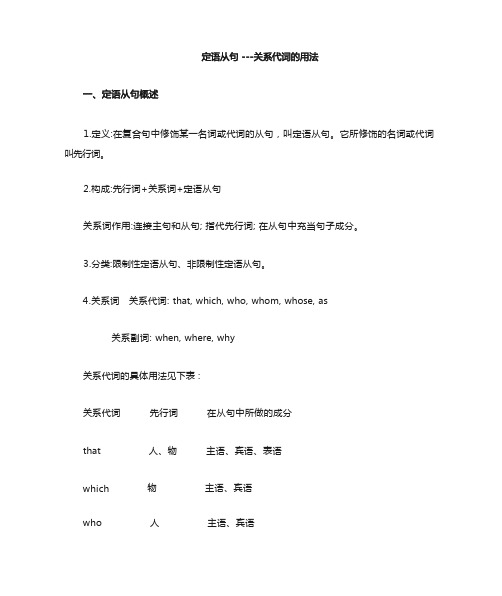
1.定义:在复合句中修饰某一名词或代词的从句,叫定语从句。
它所修饰的名词或代词叫先行词。
2.构成:先行词+关系词+定语从句关系词作用:连接主句和从句; 指代先行词; 在从句中充当句子成分。
3.分类:限制性定语从句、非限制性定语从句。
4.关系词关系代词: that, which, who, whom, whose, as关系副词: when, where, why关系代词的具体用法见下表 :关系代词that which who 先行词人、物物人在从句中所做的成分主语、宾语、表语主语、宾语主语、宾语whom 人宾语whose 人、物定语as 人、物主语、宾语、表语指人也可指物, 在定语从句中可作主语、宾语或表语,作宾语时可省略。
million.每年来游览这座城市的人的数量达到了 100 万。
(指人, 作主语)这就是他在找的那个手提箱。
(指物, 作宾语)指物,在定语从句中可作主语或宾语,作宾语时可省略。
They ignored the might account for the accident.他们忽略了那些或许可以解释事故发生原因的细节。
(作主语)指人, 在定语从句中可作主语或宾语,作宾语时可省略。
We我们为在地震中遭受重创的人们担心。
(作主语)丹尼正是我们从废墟中救出来的那个人。
(作宾语)指人, 在定语从句中作宾语,可省略 , 也可用 who 代替。
罗丝是你应该关心的人。
(作宾语)既可指人也可指物, 表"所属"关系, 在定语从句中作定语。
我认识那个人,他的房子在地震中被彻底摧毁了。
(作定语)①关系代词指代先行词在定语从句中充当主语、宾语、表语或定语,因此定语从句中不能再出现关系代词所替代的名词或代词。
昨天晚上我们看的那部电影非常吓人。
The film (that/ which) we saw it last night was very frightening.(×)The film (that /which) we saw last night was very frightening.( √)②关系代词在从句中作主语时不能省略,作宾语时可以省略。
初中英语 名词性从句知识结构图解含例句解析
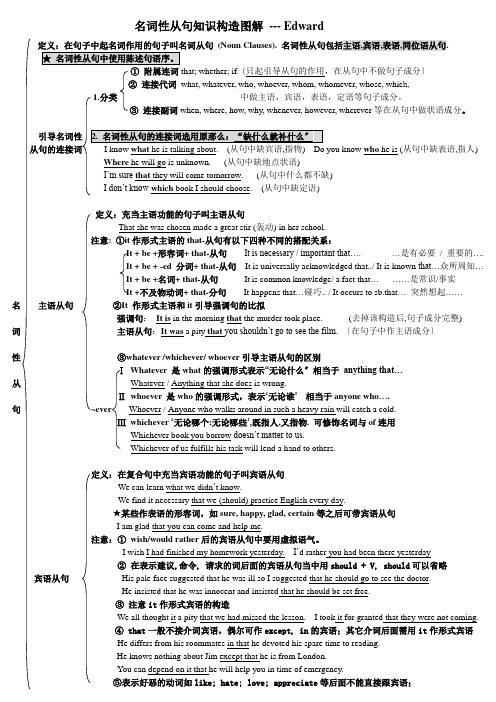
名词性从句知识构造图解--- Edward定义:在句子中起名词作用的句子叫名词从句(Noun Clauses). 名词性从句包括主语,宾语,表语,同位语从句.h,等在从句中做状语成分。
从句的连接词Do you know who he is (从句中缺表语,指人))定义:充当主语功能的句子叫主语从句That she was chosen made a great stir (轰动) in her school.注意: ①it作形式主语的that-从句有以下四种不同的搭配关系:It + be +形容词+ that-从句It is necessary / important that….…是有必要/ 重要的….It + be + -ed 分词+ that-从句It is universally acknowledged that../ It is known that…众所周知…It + be +名词+ that-从句It is common knowledge/ a fact that………是常识/事实It +不及物动词+ that-分句It happens that…碰巧.. / It occurs to sb.that…突然想起……名主语从句②It 作形式主语和it引导强调句的比拟强调句:It is in the morning that the murder took place.(去掉该构造后,句子成分完整)词主语从句:It was a pity that you shouldn’t go to see the film.〔在句子中作主语成分〕性③whatever /whichever/ whoever引导主语从句的区别ⅠWhatever 是what的强调形式表示“无论什么〞相当于anything that…从Whatever / Anything that she does is wrong.Ⅱwhoever 是who的强调形式,表示‘无论谁’相当于anyone who….句~ever Whoever / Anyone who walks around in such a heavy rain will catch a cold.Ⅲwhichever ‘无论哪个;无论哪些’,既指人,又指物. 可修饰名词与of连用Whichever book you borrow doesn’t matter to us.Whichever of us fulfills his task will lend a hand to others.定义:在复合句中充当宾语功能的句子叫宾语从句We can learn what we didn’t know.We find it necessary that we (should) practice English every day.★某些作表语的形容词,如sure, happy, glad, certain等之后可带宾语从句I am glad that you can come and help me.注意:①wish/would rather后的宾语从句中要用虚拟语气。
必备英语中考英语宾语从句综合分类解析含答案解析

必备英语中考英语宾语从句综合分类解析含答案解析一、初中英语宾语从句1.— Excuse me, could you tell me ______?—There is a supermarket over there. You can get some there.A.how I can find a supermarket B.where the supermarket isC.where I can buy some fruit D.Where can I buy some fruit【答案】C【解析】试题分析:句意:--打扰了,你能告诉我,我能在哪里买到水果?--那边有一个超市。
在那你能买到一些水果。
分析:考查宾语从句的用法,宾语从句用陈述语顺,第四项不符合。
结合答语,介绍了能买到水果的地方,因此是问买到水果的地方,第三项符合语境。
故选C考点:考查宾语从句的用法。
2.-Excuse me. Could you please tell me ____________?-Sure. There’s a bookstore on River Road.A.where I can get a dictionary B.if is there a bookstore on River Road C.where can I get a dictionary D.how could I get a dictionary【答案】A【解析】【详解】句意:——打扰了。
你能告诉我,我在哪里能买到一本词典吗?——当然可以。
在沿江路上有一家书店。
where I can get a dictionary我在哪里可以买到一本词典,if is there a bookstore on River Road在沿江路是否有一家书店,where can I get a dictionary 我在哪里可以买到一本词典. how could I get a dictionary我如何能买到一本词典。
揭秘名词性从句

“揭秘”名词性从句名词性从句是高中英语考查的重点,也是高一年级的同学们学习的难点。
现在我将该语法中的难点一一为你“揭秘”,为你扫清学习名词性从句路上的“拦路虎”。
名词性从句包括主语从句、宾语从句、表语从句和同位语从句。
一、主语从句和表语从句:作主语的从句就是主语从句,做表语的从句叫表语从句。
如:What she lacks is experience.中what she lacks就是由what引导的主语从句;The problem is why he refused my suggestion. 中why he refused my suggestion就是表语从句。
考查主语和表语从句时重点考查它们的引导词。
请同学们看看如下有关此类从句的练习与分析:1.See the flag on top of the building . That was ___ we did this morning .A when B. which C. where D. what【答案解析】D。
表语从句中缺did的宾语。
2. ________ knowledge comes from practice is known to all.A.WhatB.WhereC.IfD.That【答案解析】D.主语从句中不缺少任何成分,用that引导。
二、同位语从句有很多名词后可以跟that引起的从句,说明其内容,称作同位语从句。
请同学们看下面一个小题。
如:Nobody would stand out admitting the fact they lost the game.A. thatB. whichC. whatD. why【答案解析】A “they lost the game.”在句子中做the fact 的同位语从句, 对the fact的内容进行解释。
【注意】that引导的同位语从句和that引导的定语从句的差别:同位语从句时对其修饰的名词进行解释和说明,that在从句中不做任何成分;定语从句中的that必须代替先行词在从句中做主语或宾语。
【英语】状语从句综合分类解析

【英语】状语从句综合分类解析一、初中英语状语从句1.—The novel seems a little boring.—You won’t enjoy it _______________ you put your heart into it.A.when B.if C.after D.unless【答案】D【解析】试题分析:句意:--这部小说似乎有点儿无聊。
--如果你不用心读的话,你不会享受到这本书。
when,当……的时候;if如果;after在……之后;unless,如果不,除非。
结合句意,故选D。
考点:考查连词的用法。
2._______riding shared bikes is an easy way to travel, it also causes some problems. A.Although B.If C.Until【答案】A【解析】【详解】句意:虽然骑共享单车是一种简单的旅行方式,但也会引起一些问题。
A. Although尽管,虽然;B. If如果;C. Until直到。
根据下文it also causes some problems.可知上文是Although 引导的让步状语从句。
根据题意,故选A。
3.He has made great progress his mother is very pleased with him.A.so;that B.enough;to C.so;too D.such;that【答案】D【解析】【详解】句意:他已经取得了如此大的进步以至于他的妈妈对他非常满意。
从句意可知这里需要用到“如此….以至于”so+形容词/副词+that或such+名词+that,根据句子中的great progress意思是很大的进步,是名词短语,故用such…that, 故选D。
4.___________ she couldn’t see his face, she could tell by his voice that he was young. A.Unless B.If C.Because D.Though【答案】D【解析】【详解】句意:虽然她看不见他的脸,但是她能够通过声音分辨出他很年轻。
- 1、下载文档前请自行甄别文档内容的完整性,平台不提供额外的编辑、内容补充、找答案等附加服务。
- 2、"仅部分预览"的文档,不可在线预览部分如存在完整性等问题,可反馈申请退款(可完整预览的文档不适用该条件!)。
- 3、如文档侵犯您的权益,请联系客服反馈,我们会尽快为您处理(人工客服工作时间:9:00-18:30)。
从句是相对于主句而言的,即它是从属于某一个主句,而不能单独作一个句子。
在英语中,主要有三大从句,即名词性从句(包括主语从句,宾语从句,表语从句,同位语从句)、形容词性从句(即定语从句)、副词性从句(即状语从句,包括时间、条件、结果、目的、原因、让步、地点、方式等)。
主语从句用作主语,如::
That the earth is round is true. 地球为圆的是真实的。
宾语从句用作宾语。
如:
Do you know where he lives?
表语从句用作表语,如:
My opinion is that you should not go alone. 我的意见是你不应单独前往。
同位语从句用于解释说明前面的名词。
如:
The fact that the earth is round is true. 地球是圆的的事实是真实的。
(that从句用于解释说明the fact)
定语从句相当于一个形容词,用于修饰前面的名词。
如:
The student who answered the question was John. 回答问题的学生是John.
状语从句相当于一个副词,如:
When it rains, I usually go to school by bus. 天下雨时,我通常坐公共汽车上学。
(时间状语)
If he comes tomorrow, you will see him. 如果他明天来,你就可以看见他。
(if 引导的条件状语从句,其结构为:if +状语从句,+主句)。
要注意在状语从句中有一个规则是“主将从现”,即主句是将来时,则从句要用一般现在时表示将来。
He returned home to learn his daughter had just been engaged.他回家后得知女儿刚刚订婚了。
(结果状语,结果状语只是仅限于learn(得知),find(发现),see,hear,to be told (被告知),make(使得)等具有界限含义的动词。
)
You must speak louder so that /in order that you can be heard by all. 你必须大声说话,才能让所有人听到你说话。
(目的状语,可以由that, so that, in order that, lest, for fear that, in case等词引导。
)
Since /As the weather is so bad, we have to delay our journey. 天气那么糟,旅行推迟了。
(原因状语从句,常用because, since, as, for fear ( 恐怕), seeing that ( 既然) ,now that (=since), considering that ( 考虑到) 等引导。
)
Though/Though he was worn out, (still) he kept on working. 虽然他已经精疲力竭了,但仍然继续工作。
(让步状语从句,引导的连词主要有以下这些:though, although, as; even if, even though; whether...or...; no matter+疑问词,疑问词-ever.)
Where I live there are plenty of trees. 我住的地方树很多。
(地点状语从句,通常由where, wherever 引导。
)
As water is to fish, so air is to man. 我们离不开空气,犹如鱼儿离不开水。
(方式状语从句通常由as, (just) as…so…, as if, as though引导。
)
主句和从句的划分方法是相同的。
句子的成分从谓语动词处来划分比较容易。
谓语动词前面
的部分是主语,后面常接宾语,修饰谓语动词的是状语,修饰主语、宾语的是定语,若谓语是系动词,则系动词后的部分是表语。
如:
I am a teacher. 其中,I 是主语,am是谓语,a teacher 是表语。
He likes playing football very mucy. 其中,he是主语,likes是谓语,playing football是宾语,very much是状语。
